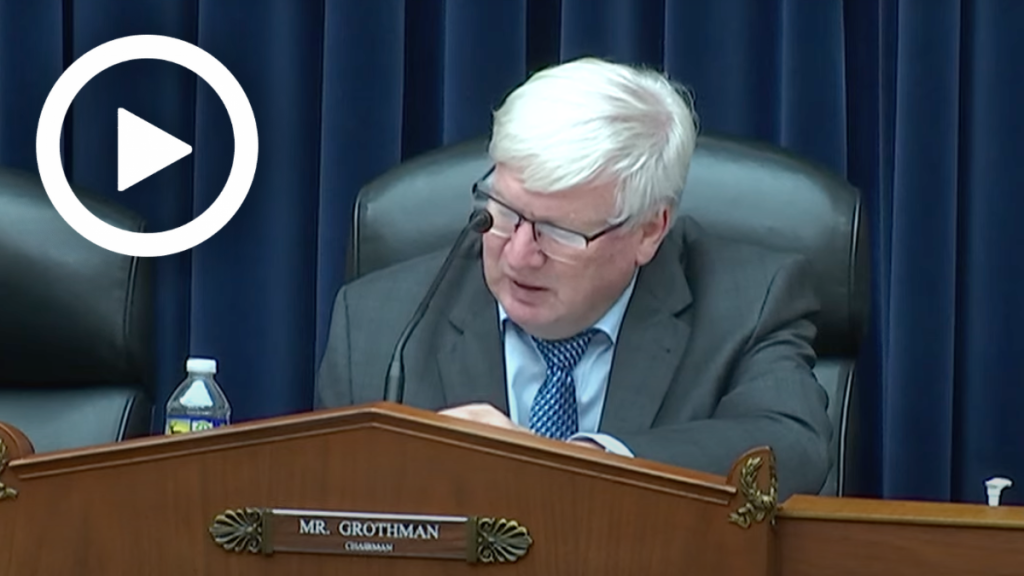Grothman: U.S. Must Lead in Championing Religious Freedom on the Global Stage
WASHINGTON—Subcommittee on National Security, the Border, and Foreign Affairs Chairman Glenn Grothman (R-Wis.) delivered opening remarks at a joint subcommittee hearing titled “Faith Under Fire: An Examination of Global Religious Persecution.” In his opening statement, Subcommittee Chairman Grothman pointed out that religious freedom is not universally recognized and respected in all parts of the world and the Biden Administration has not led from the front in protecting religious freedoms. He slammed the Biden Administration for continuing to send aid to regimes and regions where religious persecution is currently ongoing. Subcommittee Chairman Grothman concluded by calling for solutions to protect the lives of religious minorities and promote religious freedom around the world.
Below are Subcommittee Chairman Grothman’s remarks as prepared for delivery.
Good morning, and welcome to the Subcommittee on National Security, the Border, and Foreign Affairs’ hearing on examining global religious persecution.
Today’s hearing will address one of the most fundamental and pressing issues that transcends borders and boundaries: international religious freedom.
It is an issue that speaks to the very core of our values as Americans and the basic principles of human rights.
During my time in Congress, I have been deeply committed to this cause and I believe the United States can take a leading role in championing religious freedom on the global stage.
It is the right of every individual to worship, express, and practice their religion, freely, without fear.
However, we must recognize that religious freedom is not universally recognized and respected in all parts of the world.
In too many corners of the globe, individuals and entire communities face the stark reality of violence, displacement, and discrimination, solely because of their faith.
Look at what is happening in Nigeria today.
Last year, ninety percent of Christians killed globally because of their faith were Nigerian.
Boko Haram—or sub-Saharan ISIS—continue to slaughter Christians that refuse to convert to Islam, creating chaos and fear.
Yet, the Biden Administration removed Nigeria as a “country of particular concern.” A designation subjecting Nigeria to greater Congressional scrutiny. Why did the Administration remove this designation?
In Azerbaijan, ethnically Armenian Christians are being forced to flee their homes because they are facing genocide.
And tragically, as we’ve witnessed over the last several weeks, terrorist groups like Hamas [Hah-mas] will use their extremist versions of religion to justify committing mass atrocities against civilians of different ethnicities and faith.
Religious freedom is also fundamental to our national security interests.
For example, our enemies not only suppress religious freedom, but they often support terrorist proxy groups that target people based on their faith.
This Subcommittee recently held a hearing where witnesses described the Iranian regime’s assistance to terrorist organizations such as Hamas and Hezbollah that have now invited more terror, conflict, and instability to the Middle East.
For years, Iran has been supplying Hamas with funding, weapons, and support—all of which were leveraged for their recent slaughter of innocent Israeli citizens.
Make no mistake, Iran holds an equal share of responsibility for all the deaths and kidnappings Hamas has inflicted on Israelis, American citizens, and other foreign nationals.
Yet, the Biden Administration continues to give humanitarian assistance to Gaza without any plans or guarantees that taxpayer dollars won’t go to terrorists such as Hamas.
Similarly, the Biden Administration continues supply humanitarian aid to Afghanistan—which is under Taliban-control and oppressing women and girls in the name of their religion—without ensuring U.S. taxpayer dollars aren’t funding the Taliban.
Additionally, the Biden Administion continues to send foreign assistance to countries suffering from religious persecution on the condition that the receiving country adheres to progressive policies.
It is completely inappropriate for the Administration to be pushing their policy preferences on other nations.
The United States has a long history of addressing and advocating for human rights and religious freedom around the world.
Our commitment to this cause transcends administrations, party lines, and ideological differences.
We have the tools and the influence to help those abroad who are subject to religious persecution.
I hope to hear from our witnesses today ways that we can use that power to help better the lives of religious minorities and promote religious freedom around the world.
A world which encourages and promotes religious freedom is a more peaceful world.
I want to thank our witnesses for being here today and I look forward to your testimony.
